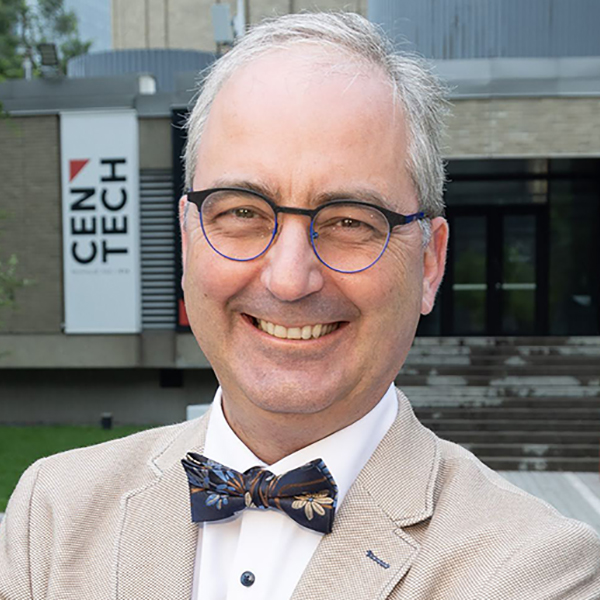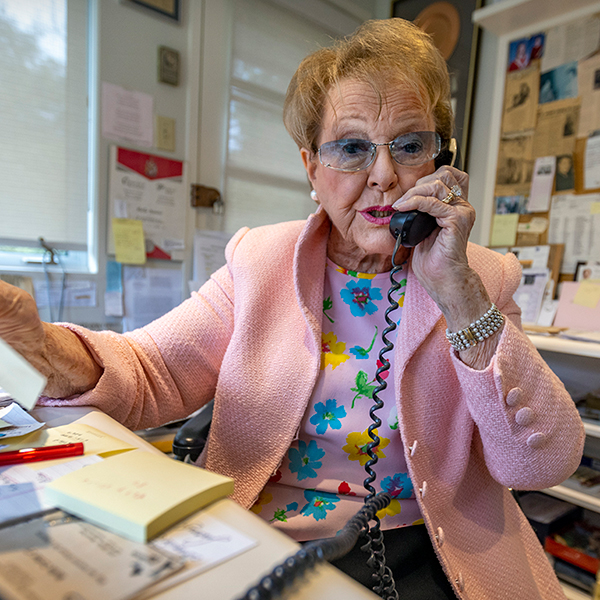Kathleen Weil answers the question without a millisecond’s hesitation – yes, she’s running again.
“I really feel for me this is an opportunity of a lifetime,” says Weil, BA’78, BCL’82, LLB’82, who plans to seek re-election as the MNA for Notre-Dame-de-Grâce when Quebecers go to the polls on October 1.
The opportunity she’s referring to is her new role as Quebec’s Minister responsible for Relations with English-Speaking Quebecers. She was moved into that newly created portfolio in last October’s cabinet shuffle.
“I’ve loved every mandate that I’ve had, but this is a startup in a way,” she says, “with all the strength that we have in the community. So it’s really exciting. I love community development, anyhow.”
Some anglophones saw it as an electoral ploy when Quebec’s Liberal government created the portfolio – a way to keep anglo voters in the Liberal fold.
Weil maintained in an interview in mid-March that she wasn’t sensing that on the ground. She’d been touring Quebec as part of consultations about the English-speaking community’s needs. Youth retention is a big issue, Weil says, noting two out of three graduates with either a PhD, master’s or bachelor’s degree, leave the province.
“It’s technically called a brain drain. So that’s one of our big concerns, is how do we retain the [English-speaking] youth.”
Other issues include access to health care in English and employability – and how the government programs that deal with these areas aren’t always well adapted to the particular needs of a minority community. “It requires a government to be listening, understanding and then adjusting the programs. So that one of the missions is to be the ears on the ground and the voice of the community within government,” she says.
In the provincial budget tabled at the end of March, the Liberal government said it would allocate $24.5 million over six years to the Secretariat for relations with English-speaking Quebecers. Among other things, the government says the money will go toward helping keep young English-speaking Quebecers in the province through employment. Details will be fleshed out in an action plan that Weil expects to produce this spring.
On this morning in March, Weil who has Irish, Scottish and “a little bit of British” ancestry, was heading to a St. Patrick’s Day luncheon, a green scarf wrapped around her neck.
Her late father, Dr. Paul Weil, was an American who came to McGill to study medicine. He fell in love with Montreal, “and with my mother, and stayed,” she says.
Weil studied political science and history at McGill. “I had the opportunity to have the wonderful Charles Taylor, so that was really extraordinary,” she says of the renowned philosopher and McGill professor emeritus.
She met her future husband, Michael Novak, BSc’76, BCL’80, LLB’81, at McGill, as well as friend and Liberal cabinet colleague, Geoffrey Kelley, BA’81, MA’85.
Weil was interested in policy and politics, but going into the latter wasn’t on her radar. After earning her law degree at McGill, Weil says she chose “to be more involved on an institutional level.”
She was the director of legal affairs at Alliance Quebec, the anglophone lobby group, from 1985-89, and held positions on several boards, including Batshaw Youth and Family Centres. She headed the former regional health board in Montreal, and helped launch the Foundation of Greater Montreal, serving as the charitable organization’s president and CEO for its first eight years.
Former Quebec premier Jean Charest would encourage her to run for the Liberals when they crossed paths. Weil, a mother of four, didn’t feel ready to jump into the fray the first time the Liberals came calling — her youngest was only three. “And then when she was 11, I asked her opinion. Everybody else said yes, but I wanted everybody to agree with this … She said ‘No, I don’t want you to go to Quebec City. Tell them to leave you alone.’ It was so funny,” Weil recalls.
She eventually ran in the 2008 provincial election – with her youngest’s blessing. She has represented the Notre-Dame-de-Graçe riding in Montreal ever since.
“Everybody has to figure out when’s the right time for them. And it can be very challenging for young women with children … it doesn’t mean it’s impossible,” says Weil.
Her other new mandate is as Minister responsible for Access to Information and the Reform of Democratic Institutions.
“It seems dry to people ‘access-to-information, protection of personal information’, but I’m bringing forward a lot of legislation … it’s a fantastic file. I did a lot of legislation [as justice minister], and this is when I say my training and background at McGill, all comes back to me.”
A major reform is in the works dealing with access to information. Quebec was a leader in that domain when it first came out with legislation in 1982, Weil says, but is now ranked near the bottom among Canadian provinces. “Our aspirations are to be in the top three.”
Before the cabinet shuffle, Weil served as immigration minister when the province welcomed thousands of Syrian refugees.
“Quebec was the first to say, ‘We have to do more.’ And so, for me, that was one of the most extraordinary moments of my career in terms of being able to play a role and for Quebec to remind really everyone of the role it’s played in the past,” she says, mentioning its “historic role” in welcoming Vietnamese “boat people”.
She concedes it was hard leaving that portfolio. “When you love a ministry and you’ve been there a long time it’s heartbreaking, but you know that change is good, too.
“And then what happens, is you kind of fall in love with your new mandate.”


